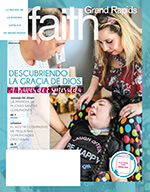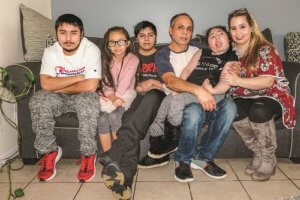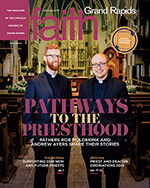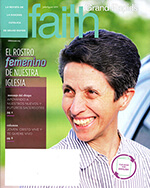
By Zulema Moret
Pope Francis, on his pilgrimage, stops first and foremost in front of the sick: a wheelchair, a blind man, a sick baby, a child who cannot speak or showing innumerable symptoms of his physical limitations, and are they to whom he dedicates his embrace and his blessing, following without doubt the example of Jesus. Throughout the Gospel accounts, we discover that Jesus was attentive to the conditions of people we now call “with different abilities” or with “special needs”.
The integration of people with special needs in the community and in the Church
Since each human being created by God deserves the life and respect of all, we have learned that their difference is not a curse but a blessing from God, and a divine tool for our spiritual perfection through the exercise of mercy and compassion towards different beings in our community. In his Apostolic Exhortation, “The Joy of Love,” Pope Francis emphatically affirms the aforementioned: “Families who accept with love the difficult test of a disabled child deserve great admiration. They give the Church and society a valuable testimony of fidelity to the gift of life. “(Amoris Laetitia # 47)
His presence invites us to face life in a different way. Thanks to them we can accept how to incorporate their disability into life as a quality. For example, the deaf recognizes his surroundings better, and from his silence he distinguishes what we do not perceive from our noise. On the other hand, a being with special needs struggles, although he must face his real limitations, or the obstacles in the face of the lack of adequate spaces to be able to circulate with his wheelchair. His joy of living in the face of shortcomings and his feeling of happiness when he can study, work or love, is a true gift from God. Other virtues are his patience for the innumerable tasks that must be challenged; the group spirit, because they are in solidarity with others who suffer their same problems or limitations and the hope that moves them forward.
These beings with different abilities continue fighting for their social integration, and it is the Church’s mission to integrate them by providing access not only to the physical place, but also to their proposals; having Bibles in Braille language, being aware of the possibility of including them in their activities such as biblical reading, theater, praise, and preaching. Their participation is important and necessary in the process of evangelization, and we know that there are methods of evangelization for the development of special ministries.
Discovering the grace of God through her
After the Sunday Mass in the parish of Saints Peter and Paul in Ionia, we spoke with Claudia Graziano, who gives us the testimony of learning what meant for her and her family the arrival of Esmeralda, who now is 17 years old, and since her birth, she has suffered severe disabilities. Claudia tells us: “When I was waiting for my daughter Esmeralda everything indicated that it was going to be a normal delivery and that everything was going well. She was born well, but a few minutes after she was born, things changed. At the hospital, in Lansing, the nurses asked me if the family had any religious inclination and we said yes, and they suggested that we baptize her as soon as possible because they did not guarantee that my daughter would live for a long time. I could not participate in her baptism because I had some complications, and they separated us. After her baptism in Lansing, Esmeralda was transported to Ann Arbor, where she was fighting for her life for 27 days. It was in those moments that I understood the true value of my faith, and I asked God to give me a sign that my daughter would be fine. ”
Claudia did not want to see her daughter suffering and being in that agony, so Claudia asked for her daughter to give her a sign of life, and so she opened one of her eyes and smiled. For Claudia, it was a very hopeful sign. Days later, in Ann Arbor, they told her that she would be transferred to Grand Rapids and that she would receive training, so that she could take care of her daughter’s care.
“I did not see, and I do not see my daughter as a load but like a lesson of life and strength.”
Regarding the relationships in Claudia’s family, she tells us: “My husband has been a very important and an exceptional base in this new life process with Esmeralda because he has supported me in everything. I have also been fortunate to find that same support in my family who have been key in supporting us since the arrival of Esmeralda to the family. I can say that the Faith that my father and mother instilled in me has been key in facing with faith this new opportunity of life.” But more complex is the insertion of this problem in the Church, so Claudia insists: “For a long time I felt that the Church was with me, but at a distance and I felt that not in all the parishes there was an opening for families that had children with special needs. Several temples were not conditioned to receive them and that made me feel that we could not go as a family to pray together because there were no access spaces for my daughter. I also thought about the elderly people who had problems climbing stairs, and I thought that they did not have that welcome either. Thank God my parish Saints Peter and Paul in Ionia has a side access ramp for people with special needs who need to enter the house of God.”
Before our question about the importance of the role played by the parish priest or priests in the commitment to those with special needs, Claudia tells us: “Not too long-ago Father Oscar came to talk with me and asked me if Esmeralda had completed his sacraments of initiation, and I told him that she only had her baptism. He asked me if I wanted her to receive the Sacrament of Confirmation, and last fall, Esmeralda was able to receive the sacrament of Confirmation with her brother Alan Eduardo and her cousin Antonio Velasco. We could perceive that for Esmeralda, this moment was very special because of her look, which is the only thing she can communicate with, she was joyful entering the Cathedral. Now in May, she is receiving the Sacrament of the Eucharist. This is a bit more complicated in the sense that she cannot digest solids. Father Oscar will give her a very small part of the Body of Christ, that as we know in our Faith, Christ is present. On this occasion Esmeralda will be accompanied by her sister Yasmin who will also receive her First Communion. For her brothers, this experience will be unforgettable because we do not know how much longer Esmeralda will be with us. Every day is a miracle because doctors have told us repeatedly. Her brain is very small and constantly give her convulsions that limit her hopes of life. We know that my daughter’s life has always been in the hands of God and living with Esmeralda has helped us grow in faith. For us, my daughter has been a great gift. ”
For that reason, as Christians we do not need norms nor an ecclesiastical code to integrate our brothers with different needs in our Christian community, only through the mercy that is born of the love poured out by the Holy Spirit in our hearts.
This article originally appeared in the May 2019 issue of FAITH Grand Rapids magazine.




